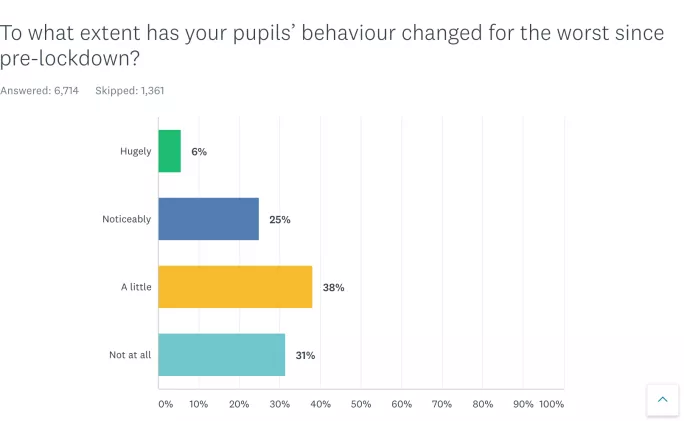- Home
- Exclusive: 69% of teachers see Covid behaviour slump
Exclusive: 69% of teachers see Covid behaviour slump

The majority of school staff in England say pupils’ behaviour has worsened since the Covid-19 lockdown, a Tes survey reveals.
More than two-thirds (69 per cent) of teachers, school leaders and classroom assistants in the survey said that pupils’ behaviour has dipped since the coronavirus lockdown closed schools to the majority of pupils.
Some 6 per cent of respondents have seen behaviour worsen hugely, another 25 per cent reported that it had worsened noticeably and 38 per cent said that it had worsened a little.
Exclusive: Third of teachers say they are disciplining pupils for not following Covid rules
Previous poll: 89% of teachers lack trust in DfE over Covid
Behaviour: Teachers could see rise in poor behaviour as pupils cope with Covid trauma, MPs told
Less than a third of school staff (31 per cent) said that behaviour had not worsened at all.
The views were collected as part of a wider Tes survey of 10,000 heads, teachers and other school staff on the impact of Covid-19 on education.

Last week Tes revealed that a third of teachers said they were routinely having to discipline pupils for coughing at people, refusing to their wash hands or crossing “bubble groups”.
School staff responding to our survey have suggested that pupils can struggle to get back into routines after six months away and that some are unsettled by new ways of working during Covid-19.
Coronavirus: The impact on pupil behaviour
Paul Whiteman, general secretary of the NAHT school leaders’ union, said: “With pupils returning to school after many weeks away, it may be that their anxieties about coronavirus manifest themselves as behaviour challenges.
“Schools will be working overtime at the moment to understand how pupils are feeling and to support them if their behaviour is affected by the disruption they’ve endured since lockdown.”
Geoff Barton, general secretary of the Association of School and College Leaders said: “These are very difficult circumstances, with students having to follow safety processes and timetabling arrangements which are very different from school life in normal times, and in many cases having spent a long time out of school during the national lockdown.
“It is therefore not surprising if this is manifesting itself in some challenging behaviour. It is to the immense credit of schools and their staff that they are handling this situation in addition to everything else which is on their plates at the moment. We hope that as students become increasingly accustomed to the safety processes, then challenging behaviour will diminish.”
One survey respondent from a secondary school said that it was mainly Year 7 students who were most affected.
They added: “They are struggling as they have to sit in one room all day, can’t make friends easily and can’t run around at lunch time. Most are miserable and not enjoying being in a new school.”
Another highlighted how the change in the school environment had impacted on pupils.
“They seem quieter, more nervous in class. Some, with special needs or circumstances, are argumentative and in flight, fright, freeze mode. It’s upsetting to see.”
Survey respondents also highlighted masks as having an impact on behaviour.
One said: “My son’s primary school seems better. The masks in secondary school, I have to say, seem to give a feeling of impending danger, which is unrealistic for the majority of people, and I find it upsetting for our students. “
Another added: “Many pupils have lost their ability to listen to their peers and negotiate solutions to social disputes. Some seem to struggle to self-regulate when things are not going their way.”
Returning after six months is ‘terribly difficult’
And one teacher said that returning to full-time education after so long away was proving difficult.
They said: “[Students] are exhausted, [they have had] nearly six months ‘off’ and then suddenly back full-time? As a teacher, this is taxing - as a student, this is terribly difficult.”
Another respondent highlighted how difficult schools are finding managing new rules to ensure that they are mitigating the risk of spreading Covid-19.
They said: “Some students struggling to adapt to school routines again. More rules this term, which some are resisting. Difficult to enforce new rules, especially at break and lunchtimes.
“As students aren’t allowed to line up in corridors to avoid mixing, they are sometimes unsupervised in classrooms. Wet weather is causing a huge problem due to lack of places where they can go when they can’t mix with other year groups.”
Responding to the survey, the Department for Education behaviour adviser Tom Bennett said: “Surveys are interesting but unreliable data sets unless they’re weighted across the population they attempt to sample. So it’s hard to know if this is representative or simply reflects the available respondents who felt most strongly about contributing.
“The challenge for schools after lockdown is the same as it has always been: how to help children learn the behaviour that helps them to flourish as learners and human beings, and to hold them accountable to those standards in a way that is both supportive and compelling.
“This part of their mission has been lent greater urgency by the need to include respiratory and tactile etiquette as part of the behaviour curriculum.
“Schools should use this moment as an opportunity to reflect on: a) what behaviour do they really need?; b) how do we teach this behaviour?; and c) how do we maintain our standards?”
Keep reading for just £1 per month
You've reached your limit of free articles this month. Subscribe for £1 per month for three months and get:
- Unlimited access to all Tes magazine content
- Exclusive subscriber-only stories
- Award-winning email newsletters



